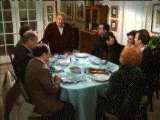 Since Bill O'Reilly proclaimed that there is a war on Christmas, Randy Kennedy of the New York Times wondered if and how an atheist would celebrate Christmas. So he contacted two of the most influential Atheists, Sam Harris, author of The End of Faith and Letter to a Christian Nation, and Richard Dawkins, the Oxford professor who opposes all belief in God as “dangerous.” What Kennedy discovered is that both men do celebrate Christmas. Harris has a Christmas tree in his house with ornaments and decorations. Dawkins reasons that Christmas has been so divorced from any religious significance, that it ceases to be a "religious" experience. Dawkins adds, "I unhesitatingly wish everyone a Merry Christmas."
Since Bill O'Reilly proclaimed that there is a war on Christmas, Randy Kennedy of the New York Times wondered if and how an atheist would celebrate Christmas. So he contacted two of the most influential Atheists, Sam Harris, author of The End of Faith and Letter to a Christian Nation, and Richard Dawkins, the Oxford professor who opposes all belief in God as “dangerous.” What Kennedy discovered is that both men do celebrate Christmas. Harris has a Christmas tree in his house with ornaments and decorations. Dawkins reasons that Christmas has been so divorced from any religious significance, that it ceases to be a "religious" experience. Dawkins adds, "I unhesitatingly wish everyone a Merry Christmas."I guess I expected Dawkins and Harris to be consistent with their belief system and do what Cosmo Kramer and Frank Costanza did on Seinfeld. Those two created their own un-Christmas-like seasonal celebration and called it "Festivus.” Instead, Dawkins simply reduces Christmas to a post-Christian observance and recognizes the times in which we live. Ironically, Professor Dawkins complains that the holidays are over-commercialized and secularized to the degree that they no longer have significant religious meaning. Dawkins shares this same opinion with many Christians who also find that the holiday has lost its spiritual significance in part or in whole.

The dilemma for Christians is more significant than it is for an Atheist. As Christians, are we living inconsistent with our belief system? Are we going through motions out of tradition and missing the significance of the incarnation of Jesus Christ? Has the birth of our Savior become more aesthetic than significant? Is there any difference between how an Atheist celebrates Christmas and how you and I celebrate Christmas?
We celebrate not just the Advent of Christ, but we use this time to refocus our lives on why He came. "She will give birth to a son, and you are to give him the name Jesus, because he will save his people from their sins." Matthew 1:21 NIV.
Ed Litton
